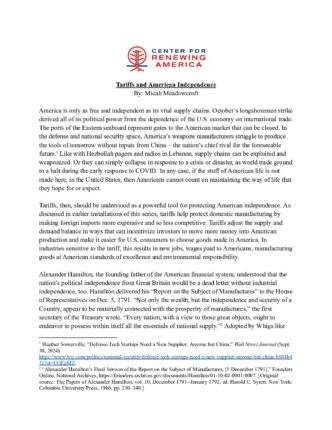
Tariffs and American Independence
This is the sixth one pager in a series on tariff policy. The introduction, “What is a Tariff For?” can be found here. The second entry, addressing concerns that tariffs contribute to inflation, can be found here. The third entry, looking at the mechanism by which tariffs may boost domestic production, can be read here. The fourth, on “trade wars,” can be read here. And the fifth, on tariffs and national sovereignty, can be found here.
America is only as free and independent as its vital supply chains. October’s longshoremen strike derived all of its political power from the dependence of the U.S. economy on international trade. The ports of the Eastern seaboard represent gates to the American market that can be closed. In the defense and national security space, America’s weapons manufacturers struggle to produce the tools of tomorrow without inputs from China—the nation’s chief rival for the foreseeable future1. Like with Hezbollah pagers and radios in Lebanon, supply chains can be exploited and weaponized. Or they can simply collapse in response to a crisis or disaster, as world trade ground to a halt during the early response to COVID. In any case, if the stuff of American life is not made here, in the United States, then Americans cannot count on maintaining the way of life that they hope for or expect.
Tariffs, then, should be understood as a powerful tool for protecting American independence. As discussed in earlier installations of this series, tariffs help protect domestic manufacturing by making foreign imports more expensive and so less competitive. Tariffs adjust the supply and demand balance in ways that can incentivize investors to move more money into American production and make it easier for U.S. consumers to choose goods made in America. In industries sensitive to the tariff, this results in new jobs, wages paid to Americans, manufacturing goods at American standards of excellence and environmental responsibility.
Alexander Hamilton, the founding father of the American financial system, understood that the nation’s political independence from Great Britain would be a dead letter without industrial independence, too. Hamilton delivered his “Report on the Subject of Manufactures” to the House of Representatives on Dec. 5, 1791. “Not only the wealth; but the independence and security of a Country, appear to be materially connected with the prosperity of manufactures,” the first secretary of the Treasury wrote. “Every nation, with a view to those great objects, ought to endeavor to possess within itself all the essentials of national supply.”2 Adopted by Whigs like Henry Clay and the original GOP, his plan of tariffs and domestic investment in industry and infrastructure protected the young America from being at the mercy of European manufacturers—trading raw materials for finished goods, resigned to remaining an economic colony, never developing beyond a largely agricultural society.
Note that Hamilton distinguished between independence and security. The national security argument for tariffs as a tool for diminishing American reliance on China—on a near-peer rival’s willingness to trade in good faith—has wide bipartisan appeal. After all, even the Biden-Harris administration has continued the Trump administration’s tariffs on many Chinese goods. From pharmaceuticals to rare earth minerals to steel and electronics, the United States cannot let the essentials of national security and the defense industrial base depend on Chinese supply chains. But independence is more than planning for the possibility of conflict; it is the ability of our country to determine its own economic policies and develop its own comparative advantages—to negotiate future trade deals from a position of strength.
The advantage of a universal tariff, compared to the system of targeted tariffs—some narrow, some globally applied to specific goods—which is currently at play, lies in part in the impossibility of routing around its effects. Tariffs applied via Section 232 of the Trade Expansion Act of 1962 and Section 301 of the Trade Act of 1974 have played an important role in diminishing U.S. reliance on Chinese imports, but have prompted efforts to circumvent these restrictions through use of pass-through nations not targeted by these restrictions. While so-called “friend shoring” will be a part of any successful realignment of American trade, especially from a security standpoint, it does not necessarily guarantee a decreased use of a rival’s supply chain, or even dependable access to a finished product. Real independence for American manufacturing requires building the wall that is a universal tariff, behind which American ingenuity can catch up with rivals.
The United States was founded by declaring independence from the dominant manufacturing power of the day; today, it betrays that independence to remain so dependent on foreign manufacturing. As numerous supply chain crises over the last few years have demonstrated with punishing clarity, the global trade system is a fragile one, and Americans cannot count on having what they do not have the capacity to make here at home.
Endnotes
- 1. Heather Somerville, “Defense-Tech Startups Need a New Supplier: Anyone but China,” Wall Street Journal (Sept. 30, 2024) https://www.wsj.com/politics/national-security/defense-tech-startups-need-a-new-supplier-anyone-but-china-b804b47c?st=CQEgMZ. ↩︎
- 2. “Alexander Hamilton’s Final Version of the Report on the Subject of Manufactures, [5 December 1791],” Founders Online, National Archives, https://founders.archives.gov/documents/Hamilton/01-10-02-0001-0007. [Original source: The Papers of Alexander Hamilton, vol. 10, December 1791 – January 1792, ed. Harold C. Syrett. New York: Columbia University Press, 1966, pp. 230–340.] ↩︎




